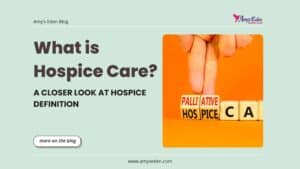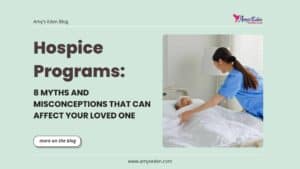
What is Hospice Care? A Closer Look at Hospice Definition
Ever wondered what hospice care really is? You’re not alone! It’s a term many of us hear, but don’t fully understand. Let’s clear up the
When your loved one ages and cannot live independently, you may have to find a safe, engaging, and comfortable environment for them. A nursing home is ideal for your loved one if they need constant medical care, but don’t need to be in a hospital. It offers relief to families and caregivers caring for their aging relatives. Medicaid is a crucial funding source for nursing home care costs and relieves you and your loved one from the financial burden.
Medicaid is a health insurance program created in 1965 to help low-income Americans with minimal financial means pay for their medical care. This health insurance covers eligible adults, people living with disabilities, and expectant mothers.

Depending on their situation, Medicaid will cover your loved one’s nursing care. Your loved one must qualify for this health insurance coverage and meet all its income requirements. One thing to note is that Medicaid may not come in to pay for your loved one’s nursing care even after you have paid out of pocket for the said care.
Medicaid-certified homes provide nursing facilities services which mainly provide the following services:
You should know that not all nursing homes accept Medicaid, and if your loved one has been in a nursing home paying out of pocket and then qualifies for Medicaid, they may have to transfer to a home that accepts Medicaid.
Your loved one must meet two required eligibility criteria before receiving care from a nursing facility under Medicaid.
To receive nursing home Medicaid assistance, a senior must meet certain limits on their personal assets and monthly income. These limits change yearly depending on your loved one marital status and the state they reside in. Most states will look into your loved one’s assets and income from the last five years before determining if they are eligible for nursing home Medicaid.
Currently, most states have the monthly income at $2,742 for singles with countable assets at $2,000, while couples’ monthly income is at $5,484 if they are both applying for Medicaid and their countable assets go up to $3,000.
Suppose your loved one doesn’t initially qualify for Medicaid and has to pay out of pocket for their nursing care. In that case, you can explore another Medicaid eligibility option known as Medicaid spend-down. This option lets an elderly individual qualify for Medicaid once they spend their countable assets to a certain level determined by their state. Then, they can qualify to receive Medicaid coverage benefits, and then Medicaid will step in and cover the rest of their nursing care and expenses.
Each state has different criteria for Nursing Home Level of Care (NHLOC), a measurement or assessment tool that states use to look into the type of care your loved one requires. These assessment tools may vary depending on the state but primarily include the following:
If your loved one’s State determines that your loved one does not require nursing care, then Medicaid will not pay for their care.

Once your loved one is eligible for nursing home care, Medicaid will cover the whole cost of the care. Some of the services that Medicaid will cover 100% without any out-of-pocket cost are:
Your loved one will have to pay out of pocket for some services like:
It’s best to find out what’s covered by Medicaid, and what’s not to help you budget accordingly.
The advantage of Medicaid is that it covers the medical expenses for eligible beneficiaries for as long as necessary, whether for a couple of weeks or the rest of their lives.
Helping your loved one apply for Medicaid can be a confusing, frustrating, complicated, and time-consuming experience. If they make any misstep, it may prolong the process and delay approval or denial from their Medicaid office. The following steps will simplify the otherwise tedious process, making it error-free and reducing the approval or denial period.
There are multiple Medicaid programs across different states targeting different groups. For instance, a Medicaid program targeting expectant mothers, seniors seeking nursing or assisted living care, and low-income families. Most states have these three eligibility categories:

Once you identify the specific Medicaid program ideal for your loved one, the next step is to determine if they automatically qualify for the program. If your loved one doesn’t automatically qualify, you can work with a professional Medicaid planner to help them become eligible. Eligibility rules are confusing and complex, but you can use the following approach to determine if your loved one is eligible:
This step is time-consuming as some documents will require you to go back up to 5 years preceding the application date. Some of the supporting documents are:
Although Medicaid is a joint program between federal and state governments, it’s the responsibility of counties in most states. You can check for a Medicaid office near you here.
Most states allow individuals applying for Medicaid to submit their application forms and supporting documents in person, online, or by mail. You can log in to your county’s website and submit your application here.
After submitting your application, you will have to wait for the Medicaid office to review it and make a decision. The federal law allows the Medicaid office a couple of days to review and approve or deny your application and then get back to you with their decision.
For people living with disabilities, the office has up to 90 days, and for other personnel, including seniors, the office has up to 45 days. However, your local Medicaid office may take longer to reply, and there is no way you can enforce the federal law. All you can do is be patient and wait for the determination.
Once you receive your loved one’s determination letter from Medicaid, whether approval or denial, you should take time and review it. The determination letter may sometimes have errors made by Medicaid reviewing staff. Whether these errors are minor or not, you can use them to appeal the Medicaid office decision. You can learn more about Medicaid appeal cases here.
Planning for the cost of nursing home care is crucial as these services often exceed what you can pay for from your income and other financial sources. Planning when your loved one doesn’t need nursing home care is essential for peace of mind. Even before needing it, looking into nursing home Medicaid will allow you to check on the 5-year look-back period and plan accordingly.
Nursing home Medicaid allows you and your family to make decisions to ease the burden of nursing home care when needed. This means that you must research and understand all the rules surrounding Medicaid to cover your loved one’s nursing home care expenses.
Taking the necessary steps for long-term nursing care planning ensures your loved one is comfortable, safe, and healthy during their twilight years. At Amy’s Eden, we encourage you to visit your county Medicaid office, physically or online, and learn more about nursing home Medicaid. If you have any questions regarding your loved one’s well-being, don’t hesitate to contact us today by email or by calling us.
Get care >

Ever wondered what hospice care really is? You’re not alone! It’s a term many of us hear, but don’t fully understand. Let’s clear up the

When your doctor announces that your loved one has a late-stage disease, it can feel like the world stops turning. The days that once felt

Having a loved one struggling with a terminal illness will take its toll even on the most healthy individual. It’s even more difficult when you

Do you have a loved one living with a serious or terminal illness? You likely have questions about what comes next and how to navigate

Amy's Eden Senior Care © 2023